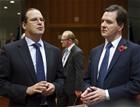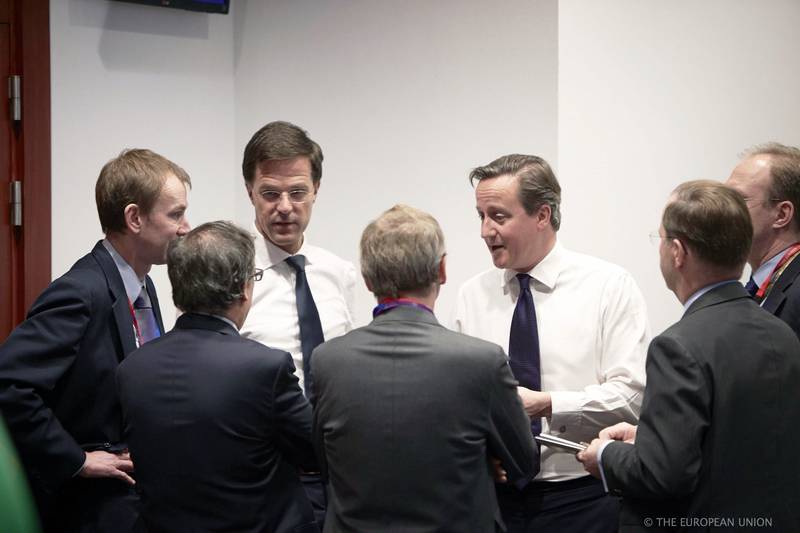Pros and Cons of a European Tax on Financial Sector
Ralitsa Kovacheva, November 10, 2011
 The introduction of a Financial Transaction Tax (FTT) in the EU has created a storm in a glass of water during the meeting of EU finance ministers on Tuesday, 8 November, against the background of the debt tsunami coming from Greece and Italy. The finance ministers exchanged both strong arguments and blows below the waist in an attempt to defend their positions. Although the Polish Presidency, embodied in Minister Jacek Rostowski, denied that the dividing line ran along the edge euro – non-euro countries, that was exactly my feeling while watching the debates.
The introduction of a Financial Transaction Tax (FTT) in the EU has created a storm in a glass of water during the meeting of EU finance ministers on Tuesday, 8 November, against the background of the debt tsunami coming from Greece and Italy. The finance ministers exchanged both strong arguments and blows below the waist in an attempt to defend their positions. Although the Polish Presidency, embodied in Minister Jacek Rostowski, denied that the dividing line ran along the edge euro – non-euro countries, that was exactly my feeling while watching the debates.
At this stage two camps are formed – 'in favour’ of the FTT, ‘against’ it and 'neutral, tending to be against', which require further exploration before proceeding to action. Expectedly, German Finance Minister Wolfgang Schauble and his British colleague George Osborne emerged as the leaders of the two main camps. France and Germany have committed themselves to the introduction of the new tax in the EU and the UK has been fiercely defending the City of London - Europe's largest financial centre.
Before I tell you what their arguments were, I should recall that according to the Commission's proposal from September the FTT will be applied on the exchange of financial instruments between financial institutions, where at least one of the parties is based in the EU. The Commission has proposed a minimum tax rate for trading of bonds and shares of 0.1%, and 0.01% for derivative products. Member States may, however, apply higher rates. According to the Commission, the tax will cover 85% of the transactions between financial institutions (banks, investment firms, insurance companies, pension funds, hedge funds and others), but will not affect citizens and businesses.
House mortgages, bank loans to small and medium enterprises, or contributions to insurance contracts will not be taxed. Spot currency exchange transactions and the raising of capital by enterprises or public bodies, through the issuance of bonds and shares on the primary market, also fall out of the FTT's scope (the exception does not cover trading bonds on secondary markets).
The estimated revenues from the new tax are approximately 57 billion euros per year and will be divided between the EU and the Member States. The goal is this money to be used as own resources in the European budget, which will reduce Member States' contributions. The possibility to use the money for fighting climate changes or as development aid is also under consideration.
The chief advocate of the introduction of the FTT Wolfgang Schauble emphasised on the need for a quick solution because this was what the citizens expected. Markets should not dictate to our democracies, the German finance minister said. He directly attacked the UK, without naming it, saying: "We will spend 20 years talking about this if we are going to wait the acceptance of the last island in the world." Some economies rely heavily on revenues from financial services, Schauble continued, "but I am pleased that in Germany we also have some real economy as well, not just financial economy."
"Obviously a global solution would be the best solution, but a global solution would be only achieved if someone makes the first move. We cannot wait for it to be applied in Shanghai first and then follow suit," Mr Schauble noted. He made a direct warning that if needed, the tax should be introduced only in the euro area: "I hope our friends in the non euros will think very carefully about the possibility of creating differences between the ten and the seventeen." Tthese differences should be the least possible, Schauble said.
In support of FTT introduction, Belgian Finance Minister Didier Reynders said he did not understand why all goods and services could be taxed, even water, but financial transactions had to be an exception. He pointed out that many EU countries had introduced some sort of a tax on transactions and the idea was these practises to be harmonised. Mr Reynders also did not rule out the option FTT to be  implemented only in the euro area, if no agreement were reached between all 27 countries. Finnish Finance Minister Jutta Urpilaynen urged her colleagues to show political will, because "if there is enough political will we can overcome the technical difficulties." Unequivocal positions in favour of the FTT were expressed also by France, Spain, Greece and Slovenia.
implemented only in the euro area, if no agreement were reached between all 27 countries. Finnish Finance Minister Jutta Urpilaynen urged her colleagues to show political will, because "if there is enough political will we can overcome the technical difficulties." Unequivocal positions in favour of the FTT were expressed also by France, Spain, Greece and Slovenia.
Countries that did not express extremely negative positions raised important questions that must be explored before deciding in favour or against the FTT: Who will ultimately pay this tax; is it the best time for its introduction; what will be the potential consequences for European competitiveness and how the revenues will be used.
 British finance minister George Osborne cited data from the European Commission that the tax would have serious impact on economic growth, would reduce European GDP by 3.5% [here the data quoted by him differ with those in the Commission's proposal - between 1.76% and 0.53%] and would cost half a million jobs. Like many times before, Mr Osborne reiterated that the tax would drive financial businesses outside Europe, which would reduce European competitiveness globally. We must be honest about who would actually pay this tax, George Osborne said: "There is not a single banker in this world that is going to pay this tax. There are no banks that are going to pay this tax. The people who will pay this tax are pensioners." He also recalled: "I am all in favour of a tax paid by bankers and banks, that’s why I have introduced a bank levy in the United Kingdom, paid by the banks and their shareholders."
British finance minister George Osborne cited data from the European Commission that the tax would have serious impact on economic growth, would reduce European GDP by 3.5% [here the data quoted by him differ with those in the Commission's proposal - between 1.76% and 0.53%] and would cost half a million jobs. Like many times before, Mr Osborne reiterated that the tax would drive financial businesses outside Europe, which would reduce European competitiveness globally. We must be honest about who would actually pay this tax, George Osborne said: "There is not a single banker in this world that is going to pay this tax. There are no banks that are going to pay this tax. The people who will pay this tax are pensioners." He also recalled: "I am all in favour of a tax paid by bankers and banks, that’s why I have introduced a bank levy in the United Kingdom, paid by the banks and their shareholders."
As to the argument that if Europe gave an example with the introduction of the  tax, others would follow suit, Mr Osborne said: "And the idea that the US or China, or Singapore will contemplate this in my lifetime, I think it’s fanciful, frankly." The British finance minister denied that there was confrontation between the eurozone and the other ten countries on the issue because, according to his accounts, there were four eurozone countries that were against FTT. Among the member states that took the floor Cyprus and Malta openly opposed the FTT, Italy expressed principled support but raised serious considerations against it, and the Netherlands announced that it was doing its own research of the potential impact of FTT introduction. It is particularly important whether the tax would raise the interest rates on government loans and whether indeed the main burden would be borne by pension funds, respectively by pensioners, Dutch Finance Minister Jan Kees de Jager pointed out. Regarding the pension funds, EurActiv quoted the chairwoman of the economic committee in the European Parliament, Sharon Bowles (ALDE, UK), saying that it might be needed to exempt pension funds from taxation.
tax, others would follow suit, Mr Osborne said: "And the idea that the US or China, or Singapore will contemplate this in my lifetime, I think it’s fanciful, frankly." The British finance minister denied that there was confrontation between the eurozone and the other ten countries on the issue because, according to his accounts, there were four eurozone countries that were against FTT. Among the member states that took the floor Cyprus and Malta openly opposed the FTT, Italy expressed principled support but raised serious considerations against it, and the Netherlands announced that it was doing its own research of the potential impact of FTT introduction. It is particularly important whether the tax would raise the interest rates on government loans and whether indeed the main burden would be borne by pension funds, respectively by pensioners, Dutch Finance Minister Jan Kees de Jager pointed out. Regarding the pension funds, EurActiv quoted the chairwoman of the economic committee in the European Parliament, Sharon Bowles (ALDE, UK), saying that it might be needed to exempt pension funds from taxation.
Swedish Finance Minister Anders Borg made a very strong speech against the new tax. He said that the FTT would increase the capital costs, that would reduce investments, real wages and GDP. He described the FTT as "probably most harmful tax that could ever be invented, I would presume, maybe with the exception of a very high corporate taxation. The FTT will lower growth and increase debt costs," Mr Borg concluded.
 Czech Deputy Finance Minister Tomas Zidek attacked the argument that it was the citizens' desire, repeatedly used by FTT supporters: "The question is whether they are not asking for it because we have not been able to explain well enough that in fact, it is to be them who are going to have to pay for this tax." He also raised another reasonable question: this morning at breakfast we discussed how to recapitalise banks with public money, and now we are debating how to tax them more, he said. Other colleagues of his also noted that at a time when the EU wanted banks to have more capital it was not appropriate to impose new taxes on them.
Czech Deputy Finance Minister Tomas Zidek attacked the argument that it was the citizens' desire, repeatedly used by FTT supporters: "The question is whether they are not asking for it because we have not been able to explain well enough that in fact, it is to be them who are going to have to pay for this tax." He also raised another reasonable question: this morning at breakfast we discussed how to recapitalise banks with public money, and now we are debating how to tax them more, he said. Other colleagues of his also noted that at a time when the EU wanted banks to have more capital it was not appropriate to impose new taxes on them.
Some ministers raised the question why, since the Commission was exploring two options to tax the financial sector - based on financial transactions and on financial activities (FAT) - the second option had not been chosen. According to Sweden, a FAT based on wages and profits in the financial sector would have far less negative impact on the GDP. EU Commissioner for Taxation Algirdas Semeta explained that the FTT had been chosen because it had bigger potential revenues, it was easy to administrate and was a workable solution.
The Bulgarian position was also firmly against the new tax. Strong reservations about the proposal were voiced by Luxembourg, Latvia, Romania, Slovakia, Ireland, Denmark.
Listening to the ministers' speeches I was once again convinced that the main argument in favour of the introduction of FTT was actually the main argument against it. The claim that this tax will restore fairness, by giving taxpayers back money spent to save banks, raises the question whether it is needed for economical or political reasons. In a statement after the ECOFIN meeting Commissioner Semeta noted: "We just need to look at the demonstrations – across the EU and across the world – to see how greatly citizens want the financial sector to make a proper contribution to the economy and to society as a whole." The idea of the FTT enjoys hot and insistent support in the European Parliament with the same argument – social justice.
Last year, when the idea was launched for the first time by European  Commission President Jose Manuel Barroso, euinside wrote: "It is dangerous when rules and economic needs are being replaced by moral imperatives such as ‘common good’. Because abusing with them is easier than with any money." As the discussions of EU finance ministers showed, European citizens should be careful what they wish for because it might come true.
Commission President Jose Manuel Barroso, euinside wrote: "It is dangerous when rules and economic needs are being replaced by moral imperatives such as ‘common good’. Because abusing with them is easier than with any money." As the discussions of EU finance ministers showed, European citizens should be careful what they wish for because it might come true.
 Kristalina Georgieva | © Council of the EU
Kristalina Georgieva | © Council of the EU Mark Rutte, David Cameron | © Council of the EU
Mark Rutte, David Cameron | © Council of the EU | © European Parliament
| © European Parliament | © European Parliament
| © European Parliament | © The Council of the European Union
| © The Council of the European Union | © European Parliament
| © European Parliament